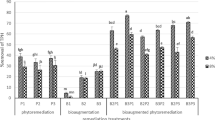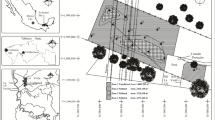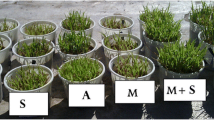Abstract
Petroleum contamination is a significant environmental problem in the Yellow River Delta. The responses of two native salt-tolerant plant species, alfalfa (Medicago sativa) and bristle grass (Setaria uiridis Beauv), to soil petroleum contamination were investigated at five levels between 0 and 2.0% (w/w). Results showed that the total, aboveground and underground plant biomasses of both species were significantly reduced by petroleum contamination (p < 0.05), with the inhibition enhanced with increased petroleum levels. However, the emergence rate of bristle grass was promoted by petroleum contamination. Following 100 days of exposure, the number of soil petroleum degraders increased greatly, with a trend of initial increase followed by a decrease at 1.5% contamination or higher. Compared to bulk soils, bacteria-degrading alkanes, total hydrocarbons and PAHs in alfalfa rhizosphere soils increased by 1.33–4.18-, 0.85–3.01- and 4.12–12.75-fold, respectively, with an increase of 2.80–10.00-, 4.42–14.44- and 7.30–26.00-fold in bristle grass rhizosphere soils, respectively. The greatest number of petroleum degraders in bristle grass rhizosphere soils resulted in the highest petroleum degradation rate. Bristle grass may be the optimal species for petroleum remediation in the studied area.





Similar content being viewed by others
References
Abbasian F, Lockington R, Megharaj M et al (2016) The biodiversity changes in the microbial population of soils contaminated with crude oil. Curr Microbiol 72(6):663–670. https://doi.org/10.1007/s00284-016-1001-4
Ahammed GJ, Wang MM, Zhou YH et al (2012) The growth, photosynthesis and antioxidant defense responses of five vegetable crops to phenanthrene stress. Ecotoxicol Environ Saf 80:132–139. https://doi.org/10.1016/j.ecoenv.2012.02.015
Al Shami A, Harik G, Alameddine I et al (2017) Risk assessment of oil spills along the Mediterranean coast: a sensitivity analysis of the choice of hazard quantification. Sci Total Environ 574:234–245. https://doi.org/10.1016/j.scitotenv.2016.09.064
Atla RM, Hazen TC (2011) Oil biodegradation and bioremediation: a tale of the two worst spills in US history. Environ Sci Technol 45(16):6709–6715. https://doi.org/10.1021/es2013227
Badri DV, Weir TL, Van Der Lelie D et al (2009) Rhizosphere chemical dialogues: plant-microbe interactions. Curr Opin Biotechnol 20(6):642–650. https://doi.org/10.1016/j.copbio.2009.09.014
Bona C, Rezende I, Santos G et al (2011) Effect of soil contaminated by diesel oil on the germination of seeds and the growth of Schinus terebinthifoilus. Braz Arch Biol Technol 54(6):1379–1387. https://doi.org/10.1590/S1516-89132011000600025
Evans FF, Rosado AS, Sebastián GV et al (2004) Impact of oil contamination and biostimulation on the diversity of indigenous bacterial communities in soil microcosms. FEMS Microbiol Ecol 49(2):295–305. https://doi.org/10.1016/j.femsec.2004.04.007
Gao Y, Guo S, Wang J et al (2014) Effects of different remediation treatments on crude oil contaminated saline soil. Chemosphere 117:486–493. https://doi.org/10.1016/j.chemosphere.2014.08.0 70
Gao Y, Wang J, Guo S et al (2015) Effects of salinization and crude oil contamination on soil bacterial community structure in the Yellow River Delta region. China Appl Soil Ecol 86:165–173. https://doi.org/10.1016/j.apsoil.2014.10.011
Gerhardt KE, Gerwing PD, Greenberg BM (2017) Opinion: taking phytoremediation from proven technology to accepted practice. Plant Sci 256:170–185. https://doi.org/10.1016/j.plantsci. 2016.11.016
Graj W, Lisiecki P, Szulc A et al (2013) Bioaugmentation with petroleum-degrading consortia has a selective growth-promoting impact on crop plants germinated in diesel oil-contaminated soil. Water Air Soil Pollut 224:1676. https://doi.org/10.1007/s11270-013-1676-0
Günther T, Dornberger U, Fritsche W (1996) Effects of ryegrass on biodegradation of hydrocarbons in soil. Chemosphere 33(2):203–215. https://doi.org/10.1016/0045-6535(96)00164-6
Hall J, Soole K, Bentham R (2011) Hydrocarbon phytoremediation in the family Fabaceae—a review. Int J Phytoremediat 13(4):317–332. https://doi.org/10.1080/15226514.2010.495143
Hamamura N, Ward DM, Inskeep WP (2013) Effects of petroleum mixture types on soil bacterial population dynamics associated with the biodegradation of hydrocarbons in soil environments. FEMS Microbiol Ecol 85(1):168–178. https://doi.org/10.1111/1574-6941.12108
Hazen TC, Dubinsky EA, DeSantis TZ et al (2010) Deep-sea oil plume enriches indigenous oil-degrading bacteria. Science 330(6001):204–208. https://doi.org/10.1126/science.1195979
Horel A, Mortazavi B, Sobecky PA (2012) Seasonal monitoring of hydrocarbon degraders in Alabama marine ecosystems following the Deepwater Horizon oil spill. Water Air Soil Pollut 223(6):3145–3154. https://doi.org/10.1007/s11270-012-1097-5
Issoufi I, Rhykerd R, Smiciklas K (2006) Seedling growth of agronomic crops in crude oil contaminated soil. J Agron Crop Sci 192(4):310–317. https://doi.org/10.1111/j.1439-037X.2006. 00212.x
Jones RK, Sun WH, Tang CS et al (2004) Phytoremediation of petroleum hydrocarbons in tropical coastal soils II. Microbial response to plant roots and contaminant. Environ Sci Pollut Res 11(4):266–266. https://doi.org/10.1007/BF02979635
Kirk JL, Klironomos JN, Lee H et al (2005) The effects of perennial ryegrass and alfalfa on microbial abundance and diversity in petroleum contaminated soil. Environ Pollut 133(3):455–465. https://doi.org/10.1016/j.envpol.2004.06.002
Kriksunov EA (2011) Marine oil spills: the causes, environmental impact, prevention methods, response operations. Water Res 38(5):684–685. https://doi.org/10.1134/S0097807811050113
Liu WX, Hou JY, Wang QL et al (2015) Collection and analysis of root exudates of Festuca arundinacea L. and their role in facilitating the phytoremediation of petroleum-contaminated soil. Plant Soil 389(1):109–119. https://doi.org/10.1007/s11104-014-2345-9
Lu RK (2000) Soil agro-chemical analysis. China Agricultural Scientech Press, Beijing, pp 106–253
Martin BC, George SJ, Price CA et al (2014) The role of root exuded low molecular weight organic anions in facilitating petroleum hydrocarbon degradation: current knowledge and future directions. Sci Total Environ 472:642–653. https://doi.org/10.1016/j.scitotenv.2013.11.050
Mukherjee S, Heinonen M, Dequvire M et al (2013) Secondary succession of bacterial communities and co-occurrence of phylotypes in oil-polluted Populus rhizosphere. Soil Biol Biochem 58:188–197. https://doi.org/10.1016/j.soilbio.2012.11.018
Nogueira L, Inckot R, Santos G et al (2011) Phytotoxicity of petroleum contaminated soil and bioremediated soil on Allophylus edulis. Rodriguesia 62(3):459–466
Pan L, Xu R, Wen J et al (2017) Assessing PAHs pollution in Shandong coastal area (China) by combination of chemical analysis and responses of reproductive toxicity in crab Portunus trituberculatus. Environ Sci Pollut Res. https://doi.org/10.1007/s11356-017-8993-6
Peng S, Zhou Q, Cai Z et al (2009) Phytoremediation of petroleum contaminated soils by Mirabilis jalapa L. in a greenhouse plot experiment. J Hazard Mater 168(2–3):1490–1496. https://doi.org/10.1016/j.jhazmat.2009.03.036
Phillips LA, Greer CW, Farrell RE et al (2012) Plant root exudates impact the hydrocarbon degradation potential of a weathered-hydrocarbon contaminated soil. Appl Soil Ecol 52:56–64. https://doi.org/10.1016/j.apsoil.2011.10.009
Reed ML, Glick BR (2005) Growth of canola (Brassica napus) in the presence of plant growth-promoting bacteria and either copper or polycyclic aromatic hydrocarbons. Can J Microbiol 51(12):1061–1069. https://doi.org/10.1139/w05-094
Shahsavari E, Adetutu EM, Anderson PA et al (2013) Tolerance of selected plant species to petrogenic hydrocarbons and effect of plant rhizosphere on the microbial removal of hydrocarbons in contaminated soil. Water Air Soil Pollut 224:1495. https://doi.org/10.1007/s11270 -013-1495-3
Shen W, Zhu N, Cui J et al (2016) Ecotoxicity monitoring and bioindicator screening of oil-contaminated soil during bioremediation. Ecotoxicol Environ Saf 124:120–128. https://doi.org/10.1016/j.ecoenv.2015.10.005
Tian W, Zhao Y, Sun H et al (2014) The effect of irrigation with oil-polluted water on microbial communities in estuarine reed rhizosphere soils. Ecol Eng 70:275–281. https://doi.org/10.1016/j.ecoleng.2014.06.003
Wrenn BA, Venosa AD (1996) Selective enumeration of aromatic and aliphatic hydrocarbon degrading bacteria by a most-probable-number procedure. Can J Microbiol 42(3):252–258. https://doi.org/10.1139/m96-037
Xu S, Silveira ML, Inglett KS et al (2017) Soil microbial community responses to long-term land use intensification in subtropical grazing lands. Geoderma 293:73–81. https://doi.org/10.1016/j.geoderma.2017.01.019
Xu SP, Sun YG (2006) Micro-column chromatography for the separation of compound-grouped fractions of sedimentary organic matter. Geochimica 35(6):681–688 (in Chinese)
Acknowledgements
This research was financially supported by the Provincial Natural Science Foundation of Shandong (ZR2013DM001, ZR2010CL010), the National Natural Science Foundation of China (41401359) and the International Cooperation Program for Key Professor of 2014 by the Shandong Provincial Education Department, China.
Author information
Authors and Affiliations
Corresponding author
Additional information
Responsible editor: Zhihong Xu
Highlights
• Responses of two plant species to petroleum-contaminated soils were investigated.
• Plant biomass significantly reduced, with variations in plant emergence rates.
• Microbial degraders increased, then decreased with petroleum contamination levels.
• Bristle grass may be an ideal species for soil petroleum contamination remediation.
Rights and permissions
About this article
Cite this article
Xie, W., Zhang, Y., Li, R. et al. The responses of two native plant species to soil petroleum contamination in the Yellow River Delta, China. Environ Sci Pollut Res 24, 24438–24446 (2017). https://doi.org/10.1007/s11356-017-0085-0
Received:
Accepted:
Published:
Issue Date:
DOI: https://doi.org/10.1007/s11356-017-0085-0




